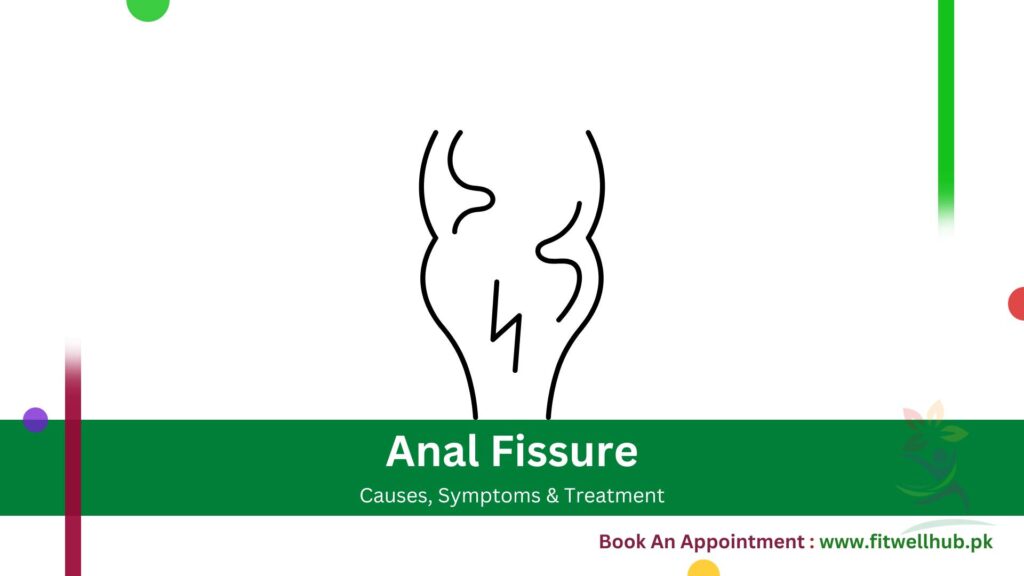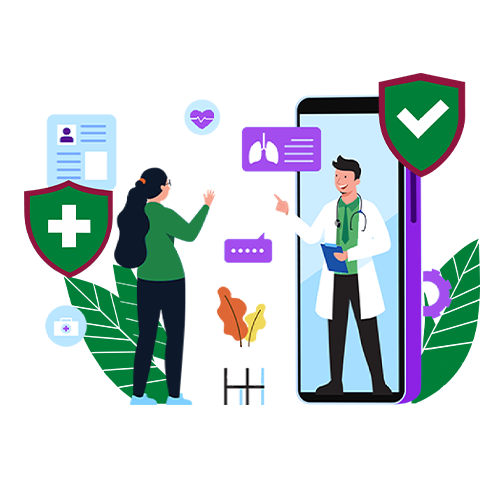An anal fissure is a small tear in the lining of the anus. Usually, it is caused by passing large or hard stools. It results in pain and bleeding during bowel movements, making it painful for affected individuals. Anal fissures are common and normally heal within a few weeks with proper care.
Quick Links
ToggleSometimes they become chronic and cause persistent discomfort. Anal fissure affects individuals of all ages but is more common in infants and middle-aged adults. Following preventive measures like maintaining a high-fiber diet, staying hydrated, and practicing good bowel habits can reduce the risk of developing anal fissures.
Also Read About Anal Itching.
Symptoms
Anal fissures generally appear with noticeable symptoms that affect daily life. A few common symptoms are discussed below:
- Pain: Pain during bowel movement is the most common symptom of anal fissure. This pain feels sharp or burning and can be severe, making it difficult to pass stool. It generally occurs at the time of the bowel movement and can continue for some time afterward.
- Bleeding: Bright red blood on stools or toilet paper is commonly present with anal fissures. The blood usually appears fresh and results from the fissure bleeding during or after a bowel movement. It is not mixed with stool but may be visible on the surface.
- Itching: Anal fissure is accompanied by itching around the anus due to fissure inflammation or by contact with bowel movements. It causes continuous discomfort and an urge to scratch, which can further irritate the area.
- Crack: A visible crack or tear in the skin around the anus indicates the presence of an anal fissure. It is a very small crack that is noticeable upon physical examination or during symptoms like pain and bleeding.
- Lump: Due to chronic irritation or healing of the fissure a small lump or skin tag near the fissure may develop. These lumps, also called sentinel piles, are generally benign but can be a persistent reminder of the underlying fissure.
- Spasms: Spasms in the anal muscles, called anal sphincter spasms, occur as a response to the fissure. These muscle contractions can cause discomfort and additional pain and may increase the difficulty in healing the fissure.
- Discomfort: Inflammation of the anal region causes discomfort due to its sensitivity. It can be increased by continuous sitting or pressure on the area, making everyday activities like sitting or driving uncomfortable.
GET IN TOUCH
Book An Appointment
When to See a Doctor
If you are experiencing pain, bleeding, or other symptoms associated with an anal fissure, it’s necessary to consult a doctor. Continuous or severe symptoms indicate a chronic fissure or other underlying conditions that require urgent medical attention. If the symptoms don’t improve within a few days of home treatment, or if they worsen, seek medical advice immediately.
At Fitwell Hub, our experienced doctors are ready to provide the care and treatment you need. To book an appointment visit here.
Causes
Anal canal trauma is the primary cause of the anal fissures. The most common causes are discussed below:
- Large stools: Delicate skin of the anal canal is stretched and torn by the passing of hard or large stools. The increased pressure and friction from trying to pass bulky stool can increase the risk of developing a fissure.
- Straining: When the hard stool is passed through the anal canal it causes straining during bowel movements and exerts excessive pressure on the anal canal. It can cause or worsen fissures.
- Diarrhea: Due to frequent bowel movements and the acidic nature of the stool chronic diarrhea irritates the anal area. Continuous irritation can cause the development of fissures as the skin becomes inflamed and damaged.
- Constipation: Constipation is another major cause of anal fissures. It involves passing hard, dry stools that can cause tearing of the anal lining. The strain associated with constipation also contributes to the risk of developing fissures.
- Childbirth: Anal injuries can occur during childbirth, especially if a vaginal delivery is done. The physical strain and stretching that occurs after birth may cause the anal canal to become fractured.
- Intercourse: If there is insufficient lubrication or trauma to the anal area during anal intercourse it may result in fissures. Fissures may develop as a result of the pressure and friction that harms delicate skin.
- Inflammatory conditions: Crohn’s disease can cause chronic inflammation in the gastrointestinal tract, and the anal canal. Fissures will develop as a result of this inflammation because of the continuous irritation and damage.
Risk Factors
There are following risk factors that can increase the risk of developing an anal fissure:
- Age: Anal fissures can occur in middle-aged people and infants. Large, hard stools are normally the cause of fissure formation in infants, while in middle-aged individuals, age-related changes in skin elasticity and bowel function are the causes of anal fissures.
- Sedentary lifestyle: Lack of physical activity can cause constipation and bowel issues. Lower levels of exercise frequently lead to harder stools and fewer bowel motions, which increases the risk of anal fissures.
Complications
Most of the time anal fissures heal on their own, but sometimes they cause complications. A few complications are discussed below:
- Chronic fissure: An anal fissure is considered chronic, if it does not heal in six weeks. Medical intervention, like prescription medication or surgical techniques, is necessary to speed up healing and reduce symptoms of chronic fissures.
- Infection: If bacteria enter through the tear an open anal fissure can become infected. Increased pain, swelling, and discharge may result from this, making the healing process more difficult and potentially requiring the use of antibiotics.
- Recurring fissures: Anal fissures can occur frequently if proper treatment and lifestyle changes are not followed. This recurrence can cause prolonged discomfort and requires continuous medical treatment to prevent future occurrences.
The chronic nature of some fissures can cause persistent pain and difficulty in passing stools. It badly affects the quality of life. Though infections are rare, they can worsen the condition, causing more complex medical issues.
Preventions:
- High-fiber diet: The use of a balanced diet, vegetables, fruits, and whole grains can soften stools and make them easier to pass. It reduces the chance of developing anal fissures and decreases the risk of straining during bowel movements.
- Hydration: Drinking plenty of water is essential for the maintenance of proper digestion and bowel function. To prevent stools from becoming dry and hard adequate hydration is necessary. It reduces the risk of constipation and strain caused by passing hard stools.
- Exercise: Physical activities are essential for maintaining healthy bowel movements and stimulating the digestive system. Regular exercise will prevent constipation and keep the bowel functioning regularly and effectively. It also minimizes the risk of developing anal fissures.
- Avoid straining: Straining increases pressure on the anal canal and can cause fissures, therefore, it’s crucial to avoid forced bowel movements. Without excessive effort allow bowel movements to occur naturally. It will protect the anal lining from injury.
At Fitwell Hub, we offer a Healthy Elite Lifestyle Program that is designed to guide you in preventing anal fissures and other health conditions.
Diagnosis
For the diagnosis of an anal fissure typically physical examinations are recommended by a healthcare provider. Fissure is directly observed or an anoscope is used to examine the anal canal. Commonly recommended tests are:
- Digital rectal exam: A gloved, lubricated finger of a healthcare provider is inserted into the rectum to evaluate muscle tone and detect any abnormality. It detects the presence of anal fissures and checks main issues such as tenderness or muscle spasms.
- Anoscopy: Anoscope is a small, tubular instrument. It is used to provide a direct view of the anal canal by inserting it into the anus. It provides a comprehensive examination of the fissure and any other abnormality in the anal region.
- Colonoscopy: In colonoscopy, a flexible tube with a camera is inserted into the rectum to examine the entire colon. This test is used to detect other underlying conditions, particularly if there is a history of bowel problems, and to ensure that no other issues are causing similar symptoms.
- Sigmoidoscopy: In this procedure, a flexible tube is used to examine the lower part of the colon and rectum. It identifies any issues in the sigmoid colon and rectal area, which can be relevant if symptoms suggest broader gastrointestinal concerns.
- Barium enema: In this procedure, a contrast material (barium) is injected into the rectum and then an X-ray is taken. It identifies abnormalities in the lower gastrointestinal tract. It is also helpful in the detection of issues like tumors or structural problems that might contribute to symptoms similar to those of anal fissures.
Fitwell Hub’s lab provides comprehensive diagnostic tests to help identify and manage anal fissures effectively. Learn more about our services here.
Treatment
Treatment for anal fissures is used to relieve symptoms and promote healing. Some commonly used treatments are:
- Topical anesthetics: During bowel movements, these medications are directly applied to the affected area to numb the pain and provide temporary relief. They alleviate the sharp, burning pain associated with anal fissures, and make it easier to manage symptoms.
- Stool softeners: These are used to soften the stool, making it easier to pass. Stool softener reduces straining and pressure on the anal canal, which is helpful in the fissure healing and preventing further irritation or injury.
- Warm baths: Warm baths, also called sitz baths, are used to relax the anal muscles and soothe the area. The warm water improves blood flow to the region, which can minimize discomfort, ease muscle spasms, and promote healing.
For chronic fissures, additional treatments used are:
Additional Treatments:
- Medications: For chronic fissures, medications such as nitroglycerin ointment or calcium channel blockers are used to relax the anal sphincter and increase blood flow to the area. This relaxation reduces muscle spasms and promotes healing by decreasing the pressure on the fissure.
- Botox injections: Botulinum toxin injections (botox) are used to temporarily paralyze the anal sphincter muscles. It will reduce muscle activity and relieve pressure and spasms in the area, by stimulating the healing of chronic fissures.
- Surgery: Lateral internal sphincterotomy is used in severe cases. In this surgical procedure, small incisions are made in the anal sphincter muscle to reduce pressure and allow the fissure to heal. It is used when other treatments have failed and is aimed at providing long-term relief.
At Fitwell Hub, our pharmacy provides the medications needed for treating anal fissures.
GET IN TOUCH
Book An Appointment
Frequently Ask Questions (FAQ’s)
An anal fissure is caused by trauma to the anal canal, such as passing large or hard stools, straining during bowel movements, continuous constipation, or severe diarrhea. Anal sex, childbirth, and inflammatory diseases including Crohn’s disease are also causing agents.
By maintaining soft stools and avoiding straining during bowel movements anal fissures can be prevented. A high-fiber diet, staying hydrated, exercising regularly, and avoiding continuous sitting on the toilet is helpful.
With proper care, such as using topical medications, warm baths, and stool softeners anal fissures can be healed within a few weeks. Healing may take a longer time if the fissure is persistent. Then it might require surgery or medical attention.
You should consult a doctor if you are suffering from continuous pain, bleeding, or discomfort that doesn’t improve within a few days of home treatment. If symptoms worsen or are accompanied by signs of infection, immediately seek medical advice.
For chronic fissures more advanced treatments, like prescription medications (e.g. nitroglycerin ointment), Botox injections to relax the anal sphincter, or surgery (lateral internal sphincterotomy) are required to slow down the pressure and promote healing.














